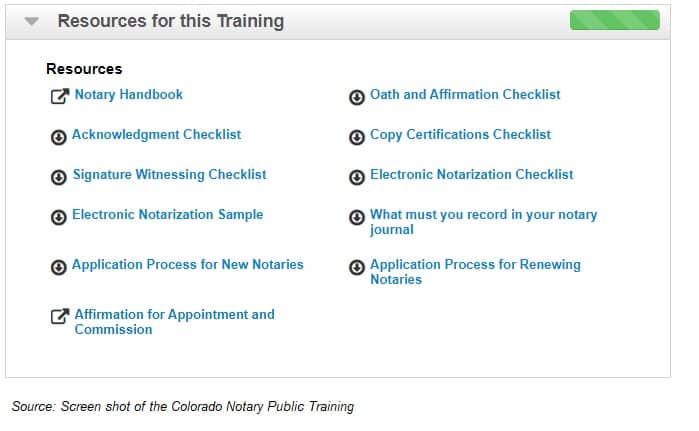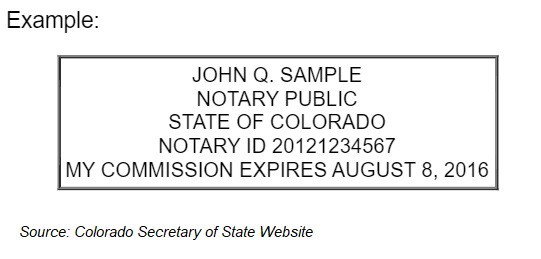(**) Disclosure: This post may contain affiliate links, meaning RealEstateCareerHQ.com will get a commission if you decide to make a purchase through the links, but at no additional cost to you.
To become a loan signing agent in Colorado, an applicant must submit a Notary Public application to the Colorado Secretary of State, complete the notary training education, pass the notary exam, pay the filing fee, and obtain the notary business supplies.
So what does a loan signing agent do in Colorado? When people are getting a mortgage to purchase a house, or they need to refinance their property, there will be loan documents involved.
Your role as a notary loan signing agent is to walk through the set of loan documents with the borrower and witness them in signing the paperwork.
You would also need to verify the identity of the signers, place the notary stamp on the signed documents, then send them back to the escrow company.
But keep in mind that you should NOT be providing legal advice, and you cannot explain the terms of the loan documents to the borrower.
In this guide, you’ll find the steps to become a notary loan signing agent in Colorado. What does it take to work in this profession? Income updates and other helpful details about this career.
Note that this guide is for general information only and not to provide any professional advice. Although I’ve tried to put down info as accurate as I could possibly find, you should always refer back to the Colorado Secretary of State and the State law.
Would you like to learn how to make $75 to $200 per signing appointment? You must check out the Loan Signing System from Mark Wills. (**) This is one of the best training programs for loan signing agents. Many students have achieved remarkable business success after taking this program.
6 Steps to Become a Notary Loan Signing Agent in Colorado

Step 1: Meet the basic requirement
- At least 18 years of age
- Legal resident or have a place of employment or practice in Colorado
- Able to read and write English
Step 2: Complete the notary education
You need to complete the notary training course. There are two ways to do that. One way is to take the course from an approved vender. Another is to take it from the Colorado Secretary of State.
The latter is a free eLearning notary training course, so I don’t see any reason not to go for it.

You just need to go through a simple registration process. Then you could access the online training course. You’ll have 90 days to finish it.
The objective of this education is to provide you with a full understanding of the responsibilities, duties, and professional standards of a notary public. Help to reduce complaints and lawsuits due to negligence or misconduct by a notary public.
The Colorado eLearning notary training course consists of seven modules:
- Introduction and the Notary Role (Estimated Time: 20 minutes)
- Satisfactory Evidence (Estimated Time: 20 minutes)
- Oaths and Affirmations, Acknowledgments and Signature Witnessing, and Copy Certifications (Estimated Time: 20 minutes)
- Electronic Notarization (Estimated Time: 20 minutes)
- Notary Journal and Official Stamp (Estimated Time: 20 minutes)
- Other Important Things to Know and Petition Circulators (Estimated Time: 20 minutes)
- Application Requirements and Closing Thoughts (Estimated Time: 20 minutes)

In addition to the course materials, you can find lots of incredible training resources. This surely can help you to get a thorough understanding of the notary business practice.
After you complete the notary course, you can register for the exam writing.
Step 3: Pass the Colorado Notary Public Exam
How to register the CO notary exam?
- Visit cosos.learnercommunity.com.
- Click on the “Register” button.
- Follow the instructions to register an account.
- Select the “Catalog” from the menu on the left-hand side.
- Find the “Colorado Notary Public Examination” course and click the “Enroll Now” button.
- Click the “Introduction and Instructions (start here)” link to start the exam.
What is the format of the Colorado notary public exam?

This is an open-book exam with 40 multiple-choice questions. Although there is no time limit, it should take around 30 minutes to complete it.
The required passing score is 80%.
To give you an idea of the type of questions you will be tested, here’s one I see at the eLearning portal.
A notary may not notarize an acknowledgment unless…
A. …the client has paid the notary’s fee.
B. …the client is in the personal presence of the notary.
C. …the notary watches the client sign the document.
D. Both B and C
Quote from the Colorado Notary Public Exam
In addition to taking the online training, another great way to prepare for the exam is to read over the Colorado Notary Public Handbook. I’ll talk more about this handbook later in this post.
Once you pass the exam, you’ll be able to print the “Completion Certificate”
Step 4: Submit the Notary Public Application

Once you pass the exam, you should return to the Secretary of State’s website. The paperwork needs to be submitted electronically, so make sure not to mail them.
Click on “Become a Notary” or “Log in” to submit your application.
In addition to the application, you’ll need to print out the affirmation form and sign it in front of a notary public. This form indicates that you swear all the info you provided is accurate and that you will comply with the notary commission rules and State Laws.
During the online submission, you will need to provide a valid ID. It could be one of the following:
- Current Colorado driver’s license or Colorado ID card.
- Signed U.S. passport.
- Current military ID card or common access card with your photo.
- Current Bureau of Indian Affairs Card or Tribal ID.
You could attach it to their online portal. But if you have a Colorado driver’s license or ID card, you can input the ID number rather than scanning and attaching a copy.
There is a $10 filing fee. You could paid by a credit/debit card.
Once the Colorado Secretary of State approves your application, you will receive a notification by email. Then you could print your out the commission certificate.
After you receive the certificate, it’s better to review and make sure all the details are correct. (e.g., your name, county of residence, commission dates).
Step 5: Get the notary business supplies

Notarize documents with a standardized stamp
To start a loan signing business, you’ll need have a notary stamp. You may purchase the notary seal from office supplies store.
It must be a rectangular ink shape, and with a rectangular outline or border.
There is no particular requirement for its size or ink color. The following info needs to appear within the stamp’s border.
- Your name as appears on your notary certificate,
- The words “NOTARY PUBLIC” and “STATE OF COLORADO,”
- Your notary ID number,
- Your commission expiration date.

Note that you cannot place other information on the stamp and that embossers cannot be used.
Maintain a good record of notary business practice

As for the journal, I find it surprising that it must be in a paper format. (Well, at least at the time I am writing this post.). It’s better to use a permanently bound journal because their pages are more difficult to remove or lose than loose-leaf pages.
One thing I really like about the Colorado Secretary of State is that you could keep your notary journal electronically. To do so, you need to notify them by filling out the “Completed Notary Journals” form.
Then you could log in to your notary account and archive the journal.
If you decide to use a physical business journal, then it is better to use one that is permanently bound because their pages are more difficult to remove or lose than loose-leaf pages.
You may find it at stationery, office supply stores, or through notary organizations.
The journal is an essential part of good business practice. It acts as proof that you have taken reasonable steps to identify the signer of a document. You should record the list notarial acts in chronological order.
A8. You must record at the time of the notarization:
1. The date of the notarial act.
2. The type of notarial act (oath, affirmation, acknowledgement, etc.),
3. Description or title of record (deed, POA, etc.),
4. Name and address of each individual signer and witness,
5. Signature of signer and any witnesses,
6. If the identity of the signer is based on personal knowledge, a statement to that effect,
7. If the identity of the signer is based on “Satisfactory Evidence,” a brief description of the method of ID (credible witness or acceptable ID) and the type of ID presented, and
8. Fee charged, if any.
A notary may also record any other related information deemed necessary.
Quote from Colorado Secretary of State
Regardless of which format you choose to archive the journals, you must keep it for at least 10 years from the last date of entry.
You must keep both the stamp and journal in a locked and secured area, where only you have direct and exclusive control of it. (e.g. a locked drawer or cabinet.)
Step 6: Register to be an eNotary

Another thing I really like about this industry in Colorado is the availability of Electronic Notary. Doing so could bring you great convenience to streamline your notary practice.
However, you still need to meet the signer physically at the time of the notarization. To apply, just login to your notary account at the Colorado Secretary of State website. There is a link “eNotary application link “at the left-hand sidebar.
Also, make sure that the software has the tamper-evident technology. You need to write down the name of the technology provider on the form.
At the time I’m writing this post, Colorado has the remote notarization option. (Where signer and notary public are not required to be in the same room.) But I guess that might only be a temporary measure.
However, on the CO Secretary of State website, they have a list of vendors that provide remote notarization services. Here’s the list for your reference:
- CSC Global, Inc.
- DocVerify
- Figure Technologies (for in-house Figure employees)
- Jetexas Information Technovation
- Nexsys
- Notarize
- NotaryCam
- Pavaso
- SafeDocs
- SIGNiX
- Simplifile – for IPEN only
- World Wide Notary
How much can you make as a notary signing agent in Colorado?

The average annual income of Loan Signing Agent in Colorado is $44,460. The income typically ranges between $28,184 to $57,308. Top earning loan signing agents in Colorado are making over $85,493.
Top 10 Highest Paying Cities for Loan Signing Agents in Colorado
| City | Annual Salary |
|---|---|
| Lafayette | $51,445 |
| Highlands Ranch | $49,432 |
| Denver | $49,429 |
| Westminster | $49,110 |
| Fort Collins | $48,939 |
| Aurora | $47,985 |
| Arvada | $47,854 |
| Centennial | $47,670 |
| Boulder | $46,763 |
| Longmont | $46,568 |
Can you make over $10,000/month as a loan signing agent? Be sure to check out our notary earning guide. You’ll find a case study where a loan signing agent has built her business to such a successful figure.
Source: ZipRecruiter – March 11, 2022
Is there demand for notary loan signing agent in Colorado?
As long as people are obtaining mortgages or refinancing their homes, there would be a demand for notary loan signing agents in Colorado.
All originated mortgages in Colorado
| YEAR | All originated mortgages |
|---|---|
| 2017 | 216,848 |
| 2016 | 263,402 |
| 2015 | 227,578 |
| 2014 | 169,959 |
| 2013 | 235,157 |
| 2012 | 263,229 |
| 2011 | 179,323 |
| 2010 | 207,951 |
| 2009 | 236,219 |
| 2008 | 162,244 |
| 2007 | 218,842 |
Source: Consumer Financial Protection Bureau – Home Mortgage Disclosure Act (HMDA) (March 18, 2020)
Furthermore, some states are “Attorney states,” which means only an attorney can handle the closing paperwork. Whereas, others are “Escrow States” where a loan signing agent can do the work.
According to the First American Title, Colorado is a not an “Attorney State,” which is good news if you are interested in starting a notary loan signing business.
What education do you need to become a Colorado notary public?
To become a notary public in Colorado, you’ll need to complete the eLearning notary training course.
Also, another a good place to learn about this profession is by reading the Colorado Notary Public Handbook. It is a 38 pages guide published by the Secretary of State.


I’ll leave a link of this handbook in the reference section at the end of this post.
Is there a exam to become a notary in Colorado?
Yes, you need to pass the Notary Public Exam to become a notary public in Colorado. This is an open-book exam with of 40 multiple-choice questions, and you’ll have unlimited time to write it. The required passing score is 80%.
Do you need to obtain a surety bond to become a Colorado notary public?
The Colorado Secretary of State does not require you to purchase any surety bond. Note that the surety bond is to protect those for whom the notary public performs a notarization, but not you as a notary public.
If you need coverage for your professional services, you should consider getting an Error & Omission insurance (E&O).
How much does it cost to become a notary in Colorado?

It would cost approximately $42 to become a notary loan signing agent in Colorado.
Here’s the breakdown:
- CO notary application filing fee – $10
- Notary seal – $17
- Business journal – $15
There could be other expenses involved, such as E&O insurance, travel expenses, and other business supplies.
How long does it take to become a notary signing agent in Colorado?

The notary training course would only take you 1-2 days to complete. Then it would take 3 to 5 business days to process your application.
It would take approximately one to two weeks to become a notary loan signing agent in Colorado.
Can a felon be a notary loan signing agent in Colorado?
Having a conviction for a felony may impact the application to become a notary loan signing agent in Colorado. The Colorado Secretary of State needs to make sure that you are a person with credibility, truthfulness, and integrity to fulfill the responsibilities of the position.
A notary may not:
1. Misstate or omit facts on a commission application. (C.R.S. 24-21-523(1)(b)). For example, a notary may not omit the fact that s/he has been convicted of a felony.
2. Be convicted of a felony ever, or of a misdemeanor in the last five years involving dishonesty. (C.R.S. 24-21-523(1)(c)).
3. Have a finding against or admission of liability in any legal proceeding or disciplinary action based on fraud, dishonesty, or deceit. (C.R.S. 24-21-
Quote from Colorado Notary Handbook
23(1)(d)).
How to renew notary in Colorado?
You need to renew the notary commission every four years. You can do so up to 90 days before your commission expires.
Upon renewal, you’ll need to get a new notary seal and destroy the old one so that it would not be misused.
To avoid an interrupted business period, don’t wait too close until the last minute.
Can I notarize for a family member in Colorado?
You must not notarize any documents where you have any financial or beneficial interest in the transaction. Therefore, notarizing a document for any family member could call into question, and such practice should be avoided.
I have more questions about being a notary loan signing agent in Colorado, where could I obtain more details?
You may contact the Colorado Secretary of State, Notary Public Expedited authentication services
- 303-894-2200 & press 4
- 303-869-4871 (FAX)
- notary@sos.state.co.us
Their office hour is from 8:00 AM – 4:30 PM.
If you are reading up to this point, I bet you must be interested in the notary signing profession. But why reinvent the wheel when there is a proven system that works? Many students had great success following the Loan Signing System (LSS) from Mark Wills. You may click here to check it out yourself. (**)
Disclaimer: The information in this post is for general information only, and not intend to provide any advice. They are subjected to change without any notice, and not guaranteed to be error-free. Some of the posts on this site may contain views and opinions from individual not related to JCHQ Publishing. They do not necessarily reflect our view or position.
(**) Affiliate Disclosure: Please note that some of the links above are affiliate links, and at no additional cost to you. Our company, JCHQ Publishing will earn a commission if you decide to make a purchase after clicking on the link. Please understand that we include them based on our experience or the research on these companies or products, and we recommend them because they are helpful and useful, not because of the small commissions we make if you decide to buy something through the links. Please do not spend any money on these products unless you feel you need them or that they will help you achieve your goals.
Reference:
- First American Title- Your Guide to Real Estate Customs by State (Source)
- Colorado Secretary of State – Notary Public (Source)
- Colorado Notary Public Handbook (Source)
- Salary.com – Notary Signing Agent Salary in Colorado (Source)
- ZipRecruiter – Loan Signing Agent Salary in Colorado (source)
- Consumer Financial Protection Bureau – Home Mortgage Disclosure Act (HMDA) (Source)
- SuretyBonds.com – Colorado Notary Public Bond (Source)

